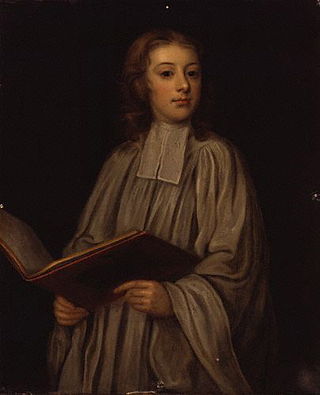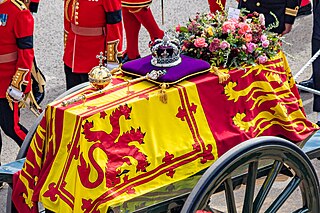'I was glad' is an English text drawn from selected verses of Psalm 122. It has been used at Westminster Abbey in the coronation ceremonies of British monarchs since those of King Charles I in 1626.

Sir John Milford Rutter is an English composer, conductor, editor, arranger, and record producer, mainly of choral music.

William Croft was an English composer and organist.

Psalm 104 is the 104th psalm of the Book of Psalms, beginning in Hebrew "ברכי נפשי" ; in English in the King James Version: "Bless the LORD, O my soul. O LORD my God, thou art very great". In the slightly different numbering system used in the Greek Septuagint and the Latin Vulgate version of the Bible, this psalm is Psalm 103. In Latin, it is known as "Benedic anima mea Domino".
Dame Judith Weir is a British composer. She served as Master of the King's Music from 2014 to 2024. Appointed by Queen Elizabeth II, Weir was the first woman to hold this office.
A coronation anthem is a piece of choral music to accompany the crowning of a monarch. Many composers have written such works. Being anthems, they are not hymns but textured motets requiring a trained choir.
James Anthony O'Donnell is a British organist, choral conductor and academic teacher who has been a professor of organ at the Yale Institute of Sacred Music in Connecticut, United States, since 2023.
Sir William Neil McKie was an Australian organist, conductor, and composer. He was Organist and Master of the Choristers at Westminster Abbey 1941–1963 and noted for his direction of the music for the marriage of Princess Elizabeth in 1947, and later her Coronation in 1953.
"Song for Athene" is a musical composition by British composer John Tavener with lyrics by Mother Thekla, an Orthodox nun, which is intended to be sung a cappella by a four-part choir. It is Tavener's best known work, having been performed by the Westminster Abbey Choir conducted by Martin Neary at the funeral service of Diana, Princess of Wales, on 6 September 1997 as her cortège departed from Westminster Abbey.

Psalm 42 is the 42nd psalm of the Book of Psalms, often known in English by its incipit, "As the hart panteth after the water brooks". The Book of Psalms is part of the third section of the Hebrew Bible, and a book of the Christian Old Testament. In the Hebrew Bible, Psalm 42 opens the second of the five books (divisions) of Psalms, also known as the "Elohistic Psalter" because the word YHWH is rarely used and God is generally referred to as "Elohim".

The coronation of Elizabeth II as queen of the United Kingdom and the other Commonwealth realms took place on 2 June 1953 at Westminster Abbey in London. Elizabeth acceded to the throne at the age of 25 upon the death of her father, George VI, on 6 February 1952, being proclaimed queen by her privy and executive councils shortly afterwards. The coronation was held more than one year later because of the tradition of allowing an appropriate length of time to pass after a monarch dies. It also gave the planning committees adequate time to make preparations for the ceremony. During the service, Elizabeth took an oath, was anointed with holy oil, was invested with robes and regalia, and was crowned Queen of the United Kingdom, Canada, Australia, New Zealand, South Africa, Pakistan, and Ceylon.

Psalm 139 is the 139th psalm of the Book of Psalms, beginning in English in the King James Version: "O Lord, thou hast searched me, and known me". In Latin, it is known as "Domine probasti me et cognovisti me". The psalm is a hymn psalm. Attributed to David, it is known for its affirmation of God's omnipresence. Alexander Kirkpatrick states that "the consciousness of the intimate personal relation between God and man which is characteristic of the whole Psalter reaches its climax here".

Psalm 121 is the 121st psalm of the Book of Psalms, beginning in English in the King James Version: "I will lift up mine eyes unto the hills, from whence cometh my help”. In the slightly different numbering system used in the Greek Septuagint and Latin Vulgate translations of the Bible, this psalm is Psalm 120. In Latin, it is known as Levavi oculos meos in montes.
Psalm 86 is the 86th psalm of the Book of Psalms, beginning in English in the King James Version: "Bow down thine ear, O Lord, hear me: for I am poor and needy". In the slightly different numbering system used in the Greek Septuagint and Latin Vulgate translations of the Bible, this psalm is Psalm 85. In Latin, it is known as "Inclina Domine". It is attributed to David.

Psalm 61 is the 61st psalm of the Book of Psalms, beginning in English in the King James Version: "Hear my cry, O God; attend unto my prayer.". In the slightly different numbering system of the Greek Septuagint version of the Bible and the Latin Vulgate, this psalm is Psalm 60. In Latin, it is known as "Exaudi Deus". The psalm is to be played on a neginah or stringed instrument. The Psalm is attributed to King David. The Jerusalem Bible calls it a "prayer of an exile".

On 30 March 2002 at 15:15 GMT, Queen Elizabeth The Queen Mother, widow to King George VI and mother to Queen Elizabeth II, died at the age of 101 at Royal Lodge, Windsor. The death of the Queen Mother set in motion Operation Tay Bridge, a plan detailing procedures including the dissemination of information, national mourning, and her funeral. Representatives of nations and groups around the world sent condolences to the Queen, the British people, and citizens of the Commonwealth. Flowers and messages of condolence were left by the public at royal residences, with members of the royal family publicly paying tribute to the Queen Mother in the days after her death. Her funeral, held on 9 April 2002 at Westminster Abbey in London, attracted 10 million viewers in the United Kingdom and cost £5.4 million.

"Praise, my soul, the King of heaven" is a Christian hymn. Its text, which draws from Psalm 103, was written by Anglican divine Henry Francis Lyte. First published in 1834, it endures in modern hymnals to a setting written by John Goss in 1868, and remains one of the most popular hymns in English-speaking denominations.
Matthew Jorysz is an English organist and pianist. He currently serves as sub-organist at Westminster Abbey.

Elizabeth II, Queen of the United Kingdom and the other Commonwealth realms, died on 8 September 2022 at Balmoral Castle in Scotland, at the age of 96. Elizabeth's reign of 70 years and 214 days was the longest of any British monarch. She was immediately succeeded by her eldest son, Charles III.
"Who shall separate us?" is a composition for an eight-part choir a cappella by James MacMillan, setting a passage from the Epistle to the Romans to music. It was commissioned for the state funeral of Elizabeth II, and was first performed at Westminster Abbey on 19 September 2022 by choirs conducted by James O'Donnell.













